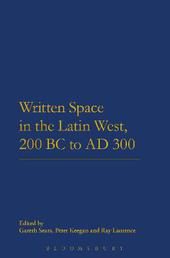
|
Written Space in the Latin West, 200 BC to AD 300
Paperback / softback
Main Details
| Title |
Written Space in the Latin West, 200 BC to AD 300
|
| Authors and Contributors |
Edited by Dr Gareth Sears
|
|
Edited by Dr Peter Keegan
|
|
Edited by Professor Ray Laurence
|
| Physical Properties |
| Format:Paperback / softback | | Pages:312 | | Dimensions(mm): Height 234,Width 156 |
|
| ISBN/Barcode |
9781474217088
|
| Classifications | Dewey:937 |
|---|
| Audience | | Tertiary Education (US: College) | | Professional & Vocational | |
|---|
| Illustrations |
25 illus
|
|
Publishing Details |
| Publisher |
Bloomsbury Publishing PLC
|
| Imprint |
Bloomsbury Academic
|
| Publication Date |
29 January 2015 |
| Publication Country |
United Kingdom
|
Description
This volume explores the creation of 'written spaces' through the accretion of monumental inscriptions and non-official graffiti in the Latin-speaking West between c.200 BC and AD 300. The shift to an epigraphic culture demonstrates new mentalities regarding the use of language, the relationship between local elites and the population, and between local elites and the imperial power. The creation of both official and non-official inscriptions is one of the most recognisable facets of the Roman city. The chapters of this book consider why urban populations created these written spaces and how these spaces in turn affected those urban civilisations. They also examine how these inscriptions interacted to create written spaces that could inculcate a sense of 'Roman-ness' into urban populations whilst also acting as a means of differentiating communities from each other. The volume includes new approaches to the study of political entities, social institutions, graffiti and painting, and the differing trajectories of written spaces in the cities of Roman Africa, Italy, Spain and Gaul.
Author Biography
Gareth Sears is lecturer in Roman History at the University of Birmingham, UK. Peter Keegan is a Senior Lecturer in Roman History at Macquarie University, Australia. Ray Laurence is Professor of Roman History and Archaeology at the University of Kent, UK.
ReviewsThe greatest success of this volume is its attempt to force the reader to think of writing as a concept in toto ... Whilst each individual chapter has a clear merit for the study of that particular place or type of writing, it is the work as a whole that should be viewed as an important contribution to furthering the scholarly discourse on the significance and prevalence of writing in Rome and the West. -- Virginia L. Campbell, University of Oxford * Bryn Mawr Classical Review * ... Well-written and informative and the whole collection is bound together by a stimulating introduction by Laurence and Sears and a fascinating afterword by Keegan ... There are surprising and provocative connections to be made throughout the volume ... * JRS *
|